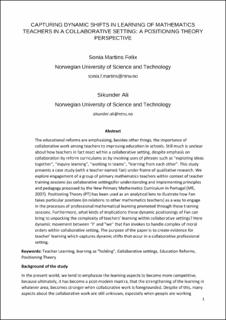| dc.contributor.author | Felix, Sonia Martins | |
| dc.contributor.author | Ali, Sikunder | |
| dc.date.accessioned | 2023-05-15T12:59:32Z | |
| dc.date.available | 2023-05-15T12:59:32Z | |
| dc.date.created | 2022-09-17T09:02:56Z | |
| dc.date.issued | 2022 | |
| dc.identifier.issn | 1465-2978 | |
| dc.identifier.uri | https://hdl.handle.net/11250/3067961 | |
| dc.description.abstract | The educational reforms are emphasizing, besides other things, the importance of collaborative work among teachers to improving education in schools. Still much is unclear about how teachers in fact react within a collaborative setting, despite emphasis on collaboration by reform curriculums as by invoking uses of phrases such as “exploring ideas together”, “inquiry learning”, “working in teams”, “learning from each other”. This study presents a case study (with a teacher named Fan) under frame of qualitative research. We explore engagement of a group of primary mathematics teachers within context of teacher training sessions (as collaborative settings)for understanding and implementing principles and pedagogy proposed by the New Primary Mathematics Curriculum in Portugal (ME, 2007). Positioning Theory (PT) has been used as an analytical lens to illustrate how Fan takes particular positions (in relations to other mathematics teachers) as a way to engage in the processes of professional mathematical learning promoted through these training sessions. Furthermore, what kinds of implications these dynamic positionings of Fan can bring to unpacking the complexity of teachers’ learning within collaborative settings? Here dynamic movement between “I” and “we” that Fan invokes to handle complex of moral orders within collaborative setting. The purpose of the paper is to create evidence for teacher’ learning which captures dynamic shifts that occur in a collaborative professional setting. | en_US |
| dc.language.iso | eng | en_US |
| dc.publisher | Paul Ernest and based at School of Education, University of Exeter | en_US |
| dc.title | CAPTURING DYNAMIC SHIFTS IN LEARNING OF MATHEMATICS TEACHERS IN A COLLABORATIVE SETTING: A POSITIONING THEORY PERSPECTIVE | en_US |
| dc.title.alternative | CAPTURING DYNAMIC SHIFTS IN LEARNING OF MATHEMATICS TEACHERS IN A COLLABORATIVE SETTING: A POSITIONING THEORY PERSPECTIVE | en_US |
| dc.type | Peer reviewed | en_US |
| dc.type | Journal article | en_US |
| dc.description.version | publishedVersion | en_US |
| dc.source.journal | Philosophy of Mathematics Education Journal | en_US |
| dc.source.issue | 39 | en_US |
| dc.identifier.cristin | 2052650 | |
| cristin.ispublished | true | |
| cristin.fulltext | original | |
| cristin.qualitycode | 1 | |
